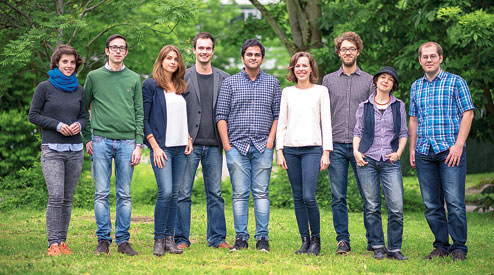
Kunal Mondal is a post-doctoral researcher at the Leibniz Centre for Tropical Marine Research (ZMT) at Bremen in Germany. He is developing nutritious probiotic food for marine organisms such as sea cucumber - a delicacy in many eastern and southeast Asian cultures. The ZMT lab in Bremen is focused on scientific monitoring of tropical marine ecosystems, which includes research on unique aquaculture, keeping an eye on possible food shortages in the future.
It would have been impossible for Mondal to join ZMT without a full scholarship from the German Academic Exchange Service or DAAD, which stands for Deutscher Akademischer Austausch Dienst - an organisation of German institutions of higher education and student bodies. "Our aim is to promote academic co-operation worldwide, especially through the exchange of students, scholars, academics and scientists," says Katja Lasch, head, international marketing, DAAD.
Apart from such scholarships, DAAD offers several fellowships for international students - at the bachelor's, master's and doctoral levels.
Each year, nearly 2,00,000 people are supported by DAAD "to gain valuable experience and expertise at home and abroad". What's more, every year it enables over 13,000 students and academicians from India to visit Germany.

Studying in Germany is a scholarship in itself. "Unlike in other European countries, studying here is not expensive because most universities are highly subsidised by the government. In several institutions, you don't have to pay anything as tuition," she explains. However, living costs can be quite high. A DAAD fellowship covers living expenses, health insurance, travel expenses and so on. There are more than 10,000 programmes for international students.

There are funding programmes for various qualification phases and stages in a career. The grants also promote the exchange of experience and networking among colleagues. The aim of this programme is to promote doctoral degrees at the home university with integrated research phases in Germany. The doctoral degrees are supervised both by a university teacher at the home university and an academic adviser at the host institute in Germany ("sandwich model").
Based on this flexible, multi-phase funding system, doctoral candidates start their doctoral degree in their home country but subsequently spend research periods in Germany. The doctorate is completed in the home country under the supervision of the German academic adviser.
Dharmendra Pratap Singh, a researcher at the National Institute of Oceanography, India, is a DAAD Fellow under the "sandwich programme" for PhD candidates. He says, "I arrived here in early October. I'm studying the Indian monsoon in an effort to predict its pattern."
You don't have to be an expert in the German language to study in Germany these days. "More than a thousand courses are offered in English. Most faculty members at the institutes are proficient in English," says Lasch.
However, to make the best of your stay, you must know some German. "You won't face much difficulty on the campus but the moment you step out, you'll have no option but to use sign language," says Mondal, who picked up the language through special classes and is now quite proficient in it.
The industry-academia link in Germany is something to write home about. "Students who apply for fellowships must understand that in Germany research is almost always application oriented," says Amitava Gupta, professor of Power Engineering, JU, and research ambassador, DAAD (Eastern India). "They merge theory with practice. In other words, the link between industry and academia is very strong," adds Gupta, who has visited Germany many times through different fellowships, including DAAD.
Last but not the least, the fun quotient, too, is high. Museums, libraries and tourist spots in the country offer huge discounts for students. Even trains and buses accept student cards.
"I love travelling to the countryside by train on weekends. Public transport is cheap, affordable and impeccable in most areas. If you have time, you can go beyond to explore other European countries," says Mondal.










